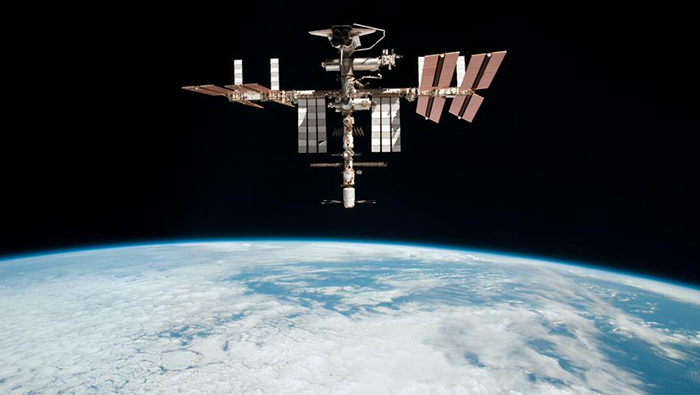- Mix
- Sun-2020-12-20 | 04:00 pm

The International Space Station (ISS) is still losing oxygen but the situation is under control, Russian space agency Roscosmos said on Saturday, adding that the agency was ready to send an additional supply of oxygen if the problem escalates.
The leak is affecting the
Russian section of the ISS, with the fault apparently located in an
access section to the Zvezda module. The exact location is not yet
clear, Russian media reported.
"We have had this leak
for quite some time, the rate is very small, nothing has happened. One
of the leaks was found and reduced, but it still remains," Roscosmos
Programme Director Sergei Krikalev told Russia's Interfax news agency.
Pressure to find the source of the leak is growing, as oxygen reserves and air pressure continue to decrease.
Cause of damage unknown
A 4.5-centimetre (1.7-inch) rip was already uncovered in October with the help of a floating tea bag, and sealed.
The
astronauts, unaware of what caused the damage, then realised there was
another leak from elsewhere in the same section of the 20-year-old
spacecraft. However, they failed to find the fault during a spacewalk in
November.
The astronauts are considering the possibility of
sealing off the affected section and using oxygen reserves, but say this
would impact the overall operation of the ISS.
'Everything is under control'
Roscosmos
has said there is no danger to the seven people on board the ISS, which
includes four Americans, two Russians and a Japanese astronaut.
Agency head Dmitry Rogozin assured the public that there were reserves of oxygen on board and that a scheduled cargo delivery in February would include oxygen.
"First, the station itself has oxygen reserves.
That is, if it is necessary to replenish oxygen and nitrogen in the
event of atmospheric pressure losses, we have such reserves. And we are
going to send a cargo ship to the ISS in February. It already has a
supply of oxygen," Rogozin was quoted as saying by Russia's TASS news
agency.
"If necessary, we can use our relationship with NASA and send part of the cargo, including oxygen, with an American cargo ship," said Rogozin. "There is no need to worry, everything is fine, everything is under control."
-
 Will Trump end up like Kennedy?2026-02-03
Will Trump end up like Kennedy?2026-02-03








